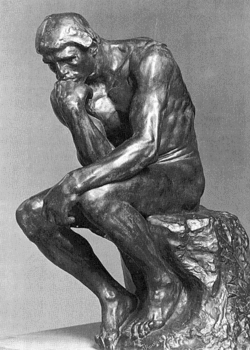 So over the past few days I have been thinking about God and knowledge of God. The thing that I was always raised thinking is that no matter how hard we may try we can never know everything about God. Not only that but if we spend that next 1,000,000 years trying to learn about the simplest aspect of God at the end we will look back on everything that we have learned and everything that we still have to learn about that aspect and realize that we have learned the smallest possible fraction of what there is to know.
So over the past few days I have been thinking about God and knowledge of God. The thing that I was always raised thinking is that no matter how hard we may try we can never know everything about God. Not only that but if we spend that next 1,000,000 years trying to learn about the simplest aspect of God at the end we will look back on everything that we have learned and everything that we still have to learn about that aspect and realize that we have learned the smallest possible fraction of what there is to know.Over the past few days, in thinking about this nothing much has changed in my stance. But it has been reinforced slightly. The biggest reason that I am writing this down is because I am starting to forget some of the nuances of the argument and if I write it down (or at minimum begin to write it down) I will have a better chance of remembering. The second reason that I am writing this down is because this is a logical argument on why we can't know everything about God, so if I am at fault in any part of my logic I will most likely need other people to comment on where they believe I went wrong, so please comment if you find something.
One last thing before I start writing about knowledge, I do say that we can't know everything about God or even the slightest aspect of God but that is not to say that I don't think that we can know something of God and who He is. For instance we know that God is made up of three distinct persons, the Father, the Son, and the Holy Spirit, but what I am going to argue is that we cannot know every fine detail about the trinity.
My thoughts on this subject come in two parts, first is that knowledge produces equality or at minimum a perceived equality, and the second is that knowledge presupposes boundaries by which you are able to have knowledge. both of those statements goes against some basic doctrine of the church, primarily that of omnipotence.

The first is that knowledge produces equality. To explain my point on this clearly I have to use three illustrations, the first is that of a magician and his audience. When you go to a magic show there is a mind set that goes with you, one that says I am going to be entertained and amazed. when you walk into the building and sit down you are saying (for that hour or so) that the magician is some how a little bit more then you, enough to pay to see the show and to sit and give him your attention. Most of the people in that building know that the tricks that the magician is doing are fake but they come to see him, however if the people suddenly know how the magician does his tricks, the magician no longer has a pull over the audience. There is no longer a reason to go to the show because there is nothing special about it, the magician has lost his power because the audience knows where his power comes from.
The second way that I would describe this is through that of an employee and an employer. think of a person who goes out and finds someone to be there assistant, then goes through the process of training them on the companies systems to the point that they can then do things one their own and teach them self how to do things. If years latter someone higher up then both of
them comes in and sees that the person who was hired is doing just as good of a job as the person who did the hiring, then he would probably promote the person to an equal position. If the person comes in and sees the person doing a better job then they would promote them to a higher position then the employer.
The third illustration could almost be made into another argument all together, but I think that it does a better job at helping this argument. This is the fact that knowledge is a created thing. We think of knowledge as something that just is, that God has knowledge of things, this way of thinking is wrong. In reality, what we call knowledge is something that God created for us, so that we may know Him and learn. If knowledge was outside of God then that would suggest that there was a world out side of God, one in which concepts lived and God takes part in the concepts. This would say that there is something that is completely on its own, it needs nothing from God. This would contradict John 1:1-3 which says "In the beginning was the Word, and the Word was with God, and the Word was God. 2 He was in the beginning with God. 3 All things came into being through Him, and apart from Him nothing came into being that has come into being."
Now the second argument is about boundaries. I believe that knowledge means that there are boundaries around something. If you can think about something and know what it is it means that you understand what boundaries apply to it. If you understand math that means that you understand that 2+2 is always 4 not 5, if you understand that every action has an equal and
opposite reaction then you understand some of the laws of physics. So if we can understand all of God that means that we would be able to understand the boundaries that apply to Him, the implications of which would be that God would have boundaries that apply to him and the would go directly against the omnipotence of God.
So if you have any thoughts please post a comment.
1 comment:
Good post PJ. I think the analogy of the magician is very fitting. The thing about experiencing the expertise of a magician is that most people don't want to know the secrets behind the tricks performed because it takes away from the mystery. But there are always those few who feel they have to know everything and when they find out more than they were ready for, they are disappointed that the mystery is gone, or use it as a way to fight that "better than me" quality you mentioned. The same can be said for us. Some of us don't want to know everything about God because that would mean that there is an everything to know instead of the omnipotent quality that is so very alluring about Him. But then there are some who have to know it all. In my opinion, it's a control issue really. Their not knowing everything about God is proof of their limited controlling capabilities over their own lives. I'm starting to ramble but I have a lot of ideas surrounding this concept. Next time I see you we can talk if you want.
Post a Comment